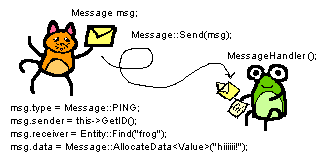

Tramway SDK 0.1.1
Github
Download
Installer (win64)
Portable .zip (win64)
Starter Template
Quick links
Home
Get Started
Messages
Messages are the main way entities communicate amongst themselves.
They allow for greater decoupling. Entities don't have to know about each other's capabilites or any other characteristics, they only need to know about the types of messages.
To allow effective communication between enities, we only need to define what a certain message type means. For this purpose the framework includes many different and useful message types with predefined meanings.

Potato cat is sending potato frog a Message.
Message types
None | NONE
Dummy message type, doesn't mean anything.
Ping | PING
Generic message type. Can be used to probe entities. When pinged, certain entities will emit an event, or print text to console.
Move pick up | MOVE_PICK_UP
Was used to create crate stacking mechanics for immersive sims. Not used anymore, since I added better techniques for the coordination of crate stacking.
Open | OPEN
Used to tell doors and similar entities to open. More generally, could be used for entities with two distinct states to assume the non-default state.
Close | CLOSE
Used to tell doors and similar entities to close. More generally, could be used for entities with two distinct states to assume the default state.
Lock | LOCK
Used to tell doors and other entities with some kind of opening and closing mechanism to stop opening. More generically could be used to tell enitities to ignore certain inputs, such as the activation messages.
Unlock | UNLOCK
Similar to locking message, but in reverse.
Toggle | TOGGLE
Similar to open and close messages. Used to tell entities to toggle their state, that is, if closed, to open, or if open, to close.
Kill | KILL
Used to tell entities to yeet themselves.
Trigger | TRIGGER
Used to pass an arbitrary message to an entity. The message data field will then contain a pointer to a Value, usually with the type of name.
For example, Quests from the kitchensink extension will create a quest entity, so that they can receive messages from Signals. Since quests have triggers, this message is used to trigger them.
Start | START
Similar to open message, but used for entities that have some kind of continuos action. For example, the Sound entity uses this message to begin playback of its associated sound.
Stop | STOP
This type is the counterpart to the start message. It tells entities to stop their action. For example, the Decoration entity uses this message to stop playing its animation, if it has one.
Activate | ACTIVATE
Sent every tick from an agentic entity. Generally meant to be used when a player presses the keyboard key associated with the Use keyboard action while facing an entity.
Activate Once | ACTIVATE_ONCE
Similar to Activate message, but meant to be sent only for the first tick of the activation.
Select | SELECT
Used to tell an entity that it is being selected. This could be when a player is facing in the direction of the entity, or when the player has placed the mouse cursor over said entity.
In response, most entities will emit a Selected event.
Set Progress | SET_PROGRESS
Used to set the progress of the action that the entity is performing. The data pointer of the message should be set to a Value. Usually it will be a Float32 value in the range from 0.0f to 1.0f.
For example, the Button entity will use it to set its opening/closing state. A value of 0.0 will close it completely, a value of 1.0 will open it completely and a value of 0.5 will set it to being half-open.
Set Animation | SET_ANIMATION
Used to set the animation of an entity. The data pointer will then be set to a Value with the type of name. The name will be the name of the animation to which this entity should switch.
Last Mesasge | LAST_MESSAGE
Not actually a message type.
Programming in C++
#include <framework/message.h>
API documentation
page.
The API for message sending is nearly identical to that of the Event.
Message msg;
msg.type = Message::PING;
msg.sender = this->GetID();
msg.receiver = Entity::Find("mongus")->GetID();
msg.data = Message::AllocateData<Value>(420);
// this will ping mongus
Message::Send(msg);
// we can also delay the message, pinging
// mongus 69 seconds in the future
msg.data = nullptr;
Message::Send(msg, 69.0f);
The Message::AllocateData() static method will allocate memory
for the message's data. This memory will get automatically released after
all of the messages get dispatched.
Unfortunately, due to certain limitations, this allocation works only for messages that get sent without a delay. This will be remedied in the future.
Just like with events, we can register our own message types.
message_t type = Message::Register("frog-message");
Scripting in Lua
Essentially the same as in C++.
msg = {}
msg.type = tram.message.PING
msg.sender = 0
msg.receiver = tram.entity.Find("mongus"):GetID()
msg.data = 420
tram.message.Send(msg, 69.0)














